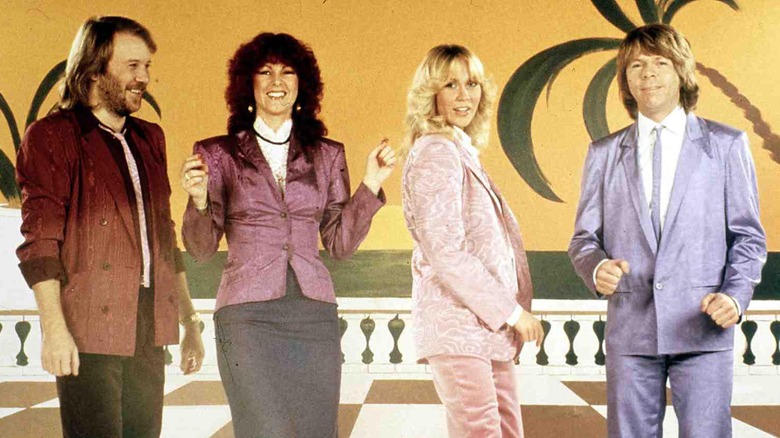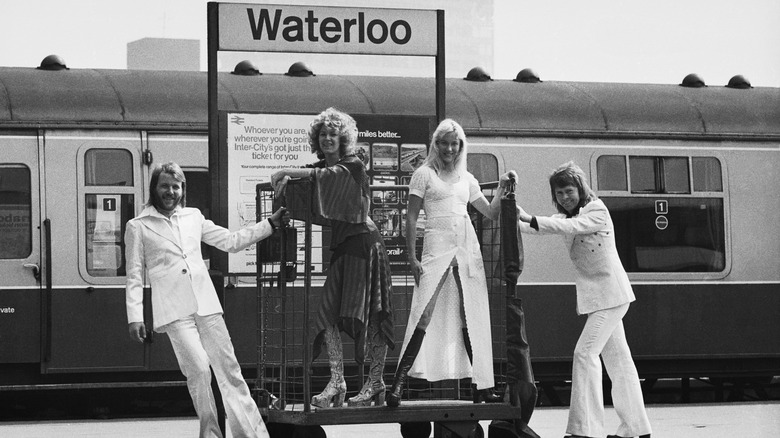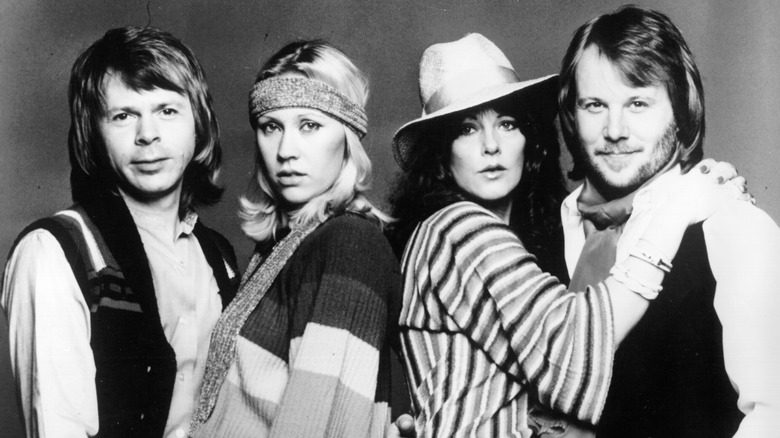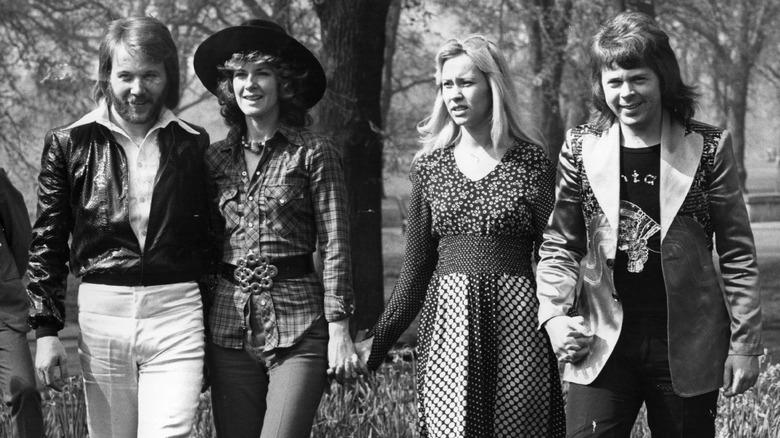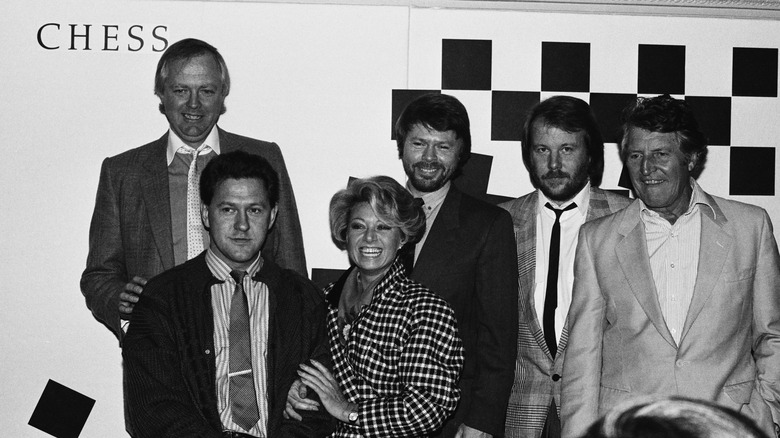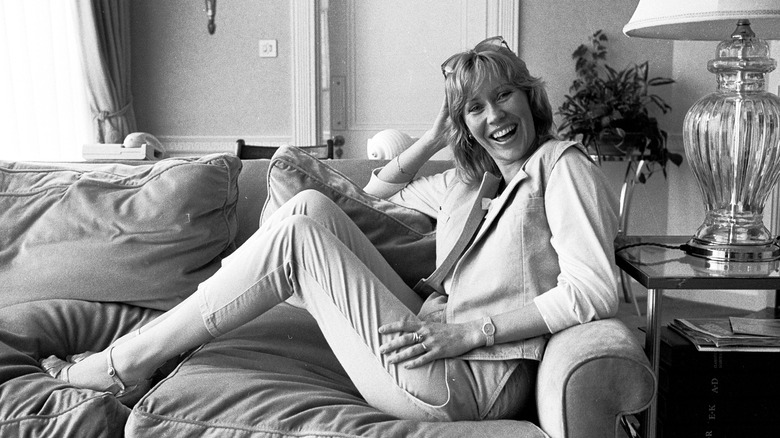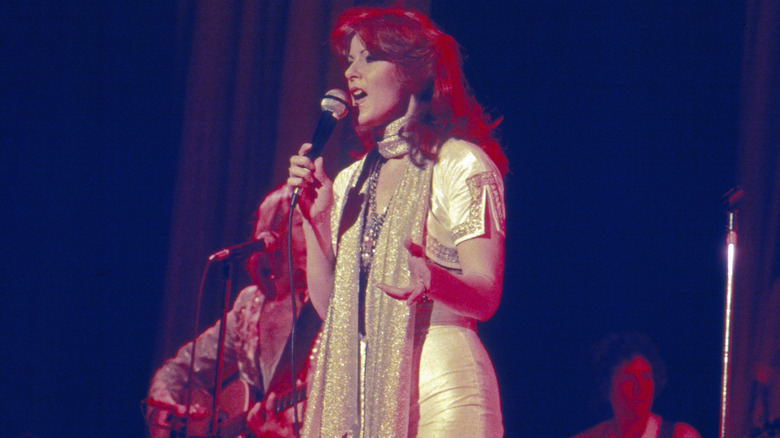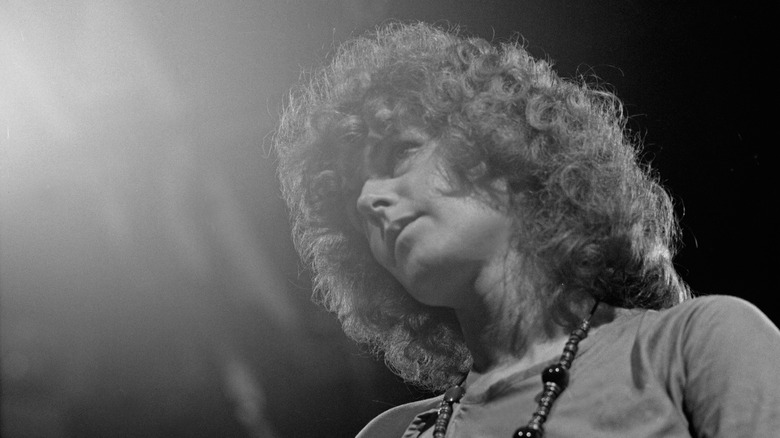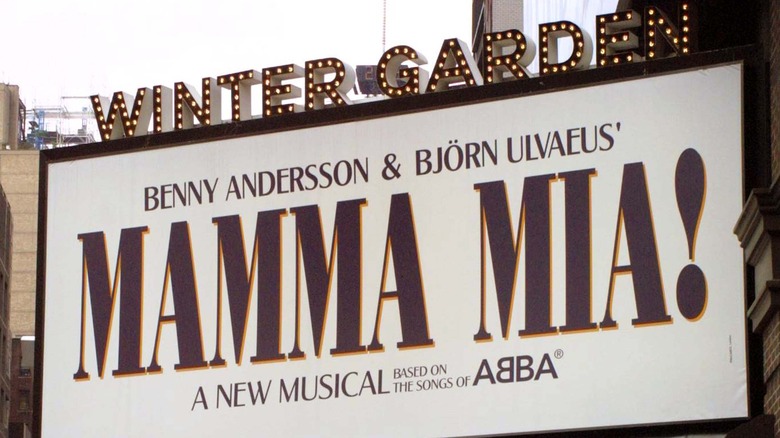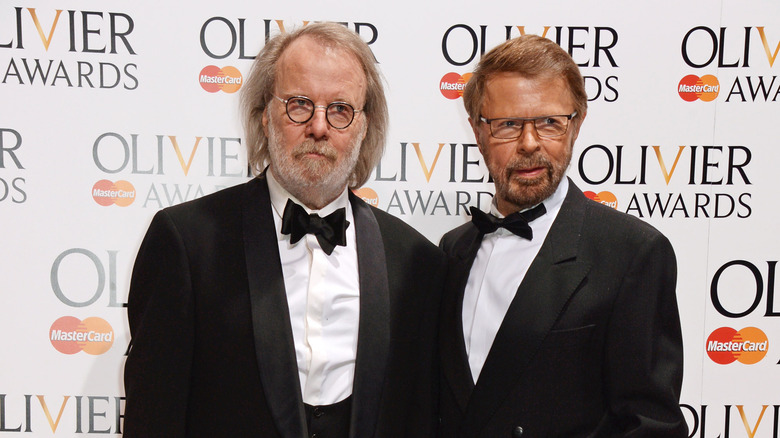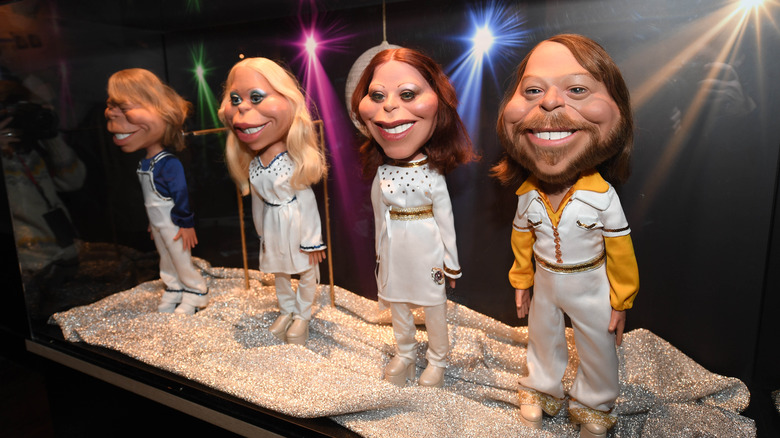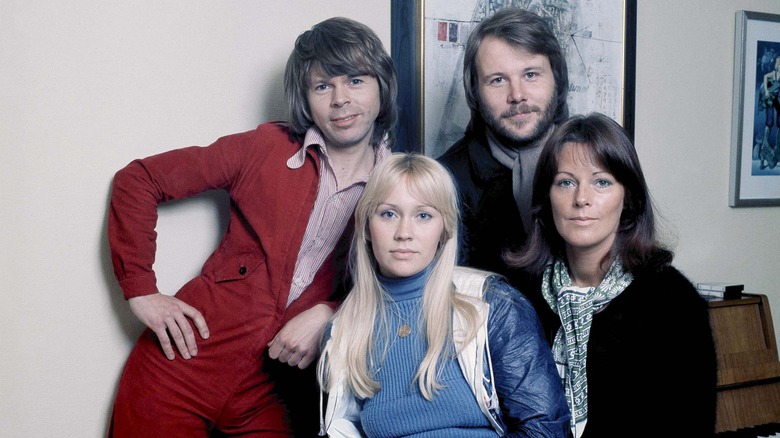What Happened To The Members Of ABBA?
When ABBA took the stage at the 1974 Eurovision Song Contest, no one could expect the phenomena that was about to take the world by storm. They became a global sensation and while they were together, their songs would frequently top the charts.
But in the 1980s, ABBA went on an indefinite hiatus, which ended up turning into the dissolution of the band. Although the members went their separate ways, they mostly continued to work in music. Björn Ulvaeus and Benny Andersson would end up working together on numerous projects after ABBA, while Agnetha Fältskog and Anni-Frid "Frida" Lyngstad went on to have solo careers. Whenever they were asked about reuniting, the answer always seemed to be a gentle but firm no. Then all of a sudden, ABBA started teasing the idea of a reunion tour with digital holograms and even claimed after 40 years, they'd started making music together again.
But even without the band itself, the music of ABBA has stayed alive in peoples' hearts. With the "Mamma Mia!" musical and film, ABBA has stretched across generations and shown the nay-sayers from their day that they were the real deal. Here's what happened to the members of ABBA.
What is Eurovision?
The Eurovision Song Contest is a yearly competition that was founded by Marcel Bezençon and first held on May 24th, 1956. And although only seven countries participated in the first Eurovision, the contest has grown to include over 40 countries. According to Eurovision, originally, participants sang in their country's national language. But in 1965, the Swedish entry was sung in English and as a result, rules were instituted stipulating that national languages had to be used throughout the song submissions. These language rules were held until 1973, but then they were briefly relaxed for four years. In 1977, the requirement of national languages was reinstated but in 1999, freedom of language was allowed once more "with apparent permanent status."
According to the ABBA website, ABBA tried to make it into the 1973 Eurovision, but their song "Ring Ring" came in third at the 1973 Melodifestivalen, where the Swedish song for Eurovision is typically selected. Undeterred, they entered again the following year with "Waterloo," and in 1974, ABBA won Eurovision and became the first Swedish group to do so.
But it wasn't all good news: "the 'stigma' of being winners of the Eurovision Song Contest made it difficult for ABBA to be taken seriously when they tried to follow this first success." It wasn't until the song "SOS" came out almost a year and a half later that ABBA became a worldwide phenomenon.
Who was ABBA?
Made up of Björn Ulvaeus, Benny Andersson, Agnetha Fältskog, and Anni-Frid "Frida" Lyngstad, ABBA was originally called Björn & Benny, Agnetha & Anni-Frid. But by 1974, they had already become ABBA, using the first letters of each of their first names. Singers.com writes that the group was started by Ulvaeus and Andersson, who met in 1966. And in 1969, they met Fältskog and Lyngstad, "who were to become not only their fiancées but also the other half of ABBA." Fältskog and Ulvaeus got married in July 1971, and Lyngstad and Andersson got married in 1978.
According to AllMusic, ABBA would become "the most commercially successful pop group of the 1970s." With hit songs like "Dancing Queen," "Mamma Mia," and "Take a Chance on Me," their songs climbed billboards around the world. In 1978, they even put out the feature film "ABBA: The Movie."
But in 1978, ABBA's "image of two happy, music-making couples" was dealt a blow when Fältskog and Ulvaeus announced their divorce. However, this wasn't the end of the band. And even when Lyngstad and Andersson announced their divorce as well in 1981, the four continued to work together. By the end of 1981, ABBA released their eighth album, "The Visitors."
Why did they break up?
Despite the divorces, Ulvaeus, Andersson, Fältskog, and Lyngstad continued to work together. However, according to the ABBA website, throughout 1982, "the energy was gradually running out of the group." Ulvaeus has stated that "Agnetha and my divorce was an amicable one, we just grew apart and decided let's split up. Benny and Frida's was a little more difficult. It was not a happy time but still very creative."
At the same time, there were a number of other factors that led the group to decide to take a break in 1982. And initially, the break-up was intended to only be "temporary." Digital Spy writes that in the 1980s, Ulvaeus and Andersson were approached about doing a musical, while Fältskog and Lyngstad had started focusing more and more on their solo careers. In 1982, ABBA didn't release any new music, putting out instead a "compilation double album of their hit singles." But none of the singles made quite the impact that they'd once had. As a result, ABBA decided to take a step back by 1983: "If they wanted to, they reasoned, they could always get back together after a few years." Their press release stated that "they went on a long indefinite break."
In 2010, still on that long break, ABBA was inducted into the Rock and Roll Hall of Fame.
Björn and Benny's Chess Musical
In the early 1980s, Tim Rice came to Ulvaeus and Andersson with the idea for a musical. And by 1984, "Chess" was born, a musical about a Cold War-era chess match between the Soviet Union and the United States of America. The LP was released in 1984 and the musical made its London stage premiere in 1986.
According to Guide to Musical Theatre, the story involves a love triangle between the American Grandmaster, the Russian champion, and the Hungarian-American chess second, "who arrives at the international championships with the American but falls for the Russian."
Unfortunately, the musical received a poor review by the New York Times' Frank Rich, who described the love triangle as "ricocheting arbitrarily between the American and the Soviet players as if she had no self respect or political convictions." Icethesite writes that Rich's review was the reason that "Chess" didn't get nominated for a single Tony Award. And with no Tony Awards on the horizon, "Chess" ended up having a "disastrously short and huge loss-making run on Broadway." However, despite "Chess'" lack of success, some of its songs like "One Night in Bangkok" and "I Know Him So Well" went on to become international hits. And even though the New York production closed after just a few months, the London production "ran for over three years," according to Australian Stage.
Agnetha's solo career
Agnetha Fältskog was a successful solo artist before ABBA, so she went back to her solo career. Her first album after ABBA, titled "Wrap Your Arms Around Me," came out in May 1983, and it was her first English-language solo album as well. According to the ABBA website, "Wrap Your Arms Around Me" did incredibly well in Sweden, "becoming one of the biggest albums of 1983." And worldwide, it sold over one million copies. In 1983, Fältskog also released the hit single "It's So Nice to Be Rich." Meanwhile, The Salt Lake Tribune reports that ABBA became just a memory for Fältskog: "There was several years after I had stopped with the group that I couldn't listen to the music."
Fältskog recorded two more albums, "Eyes of a Woman" and "I Stand Alone," but by 1986 her motivation faltered. Smooth Radio writes that after "I Stand Alone," Fältskog "went on a 17-year hiatus from the music industry." Years later, Fältskog would admit that "I was so tired ... and just wanted to be calm and be with my children." After taking a step back from her solo career, Fältskog "stepped out of the limelight" and focused on just living her life. She did few interviews and stayed out of the spotlight since her experience in ABBA had resulted in a phobia of crowds and open spaces, writes the Irish Independent.
In 2004, Fältskog came back to music with her album "My Colouring Book."
Frida's solo career
Frida Lyngstad also had a solo career before joining ABBA and she resumed her solo career once ABBA went on their indefinite break. Lyngstad's first post-ABBA solo album was "Something's Going On," produced by Phil Collins, according to UDiscoverMusic. It was also Lyngstad's first English-language album. The ABBA website writes that Lyngstad also wanted Collins to produce what would become her last album, but by the mid-1980s Collins "simply didn't have the time to devote himself to any major outside projects." For the album "Shine," Lyngstad wrote a couple of her songs for herself, "something that she hadn't done before."
Although both albums did well across Europe, Lyngstad ended up putting her singing career into "semi-retirement." Although she would occasionally work on a random project that she was interested in, like recording "Så Länge Vi Har Varann" ("As Long As We Have Each Other"), most of her work became focused on environmental charities. In the 1990s, Lyngstad joined Det Naturliga Steget (The Natural Step) and Artister För Miljön (Artists For The Environment).
In 1996, Lyngstad went back to music with her Swedish-language album "Djupa andetag" (Deep Breaths). According to ABBA Experience, the album was incredibly successful in Sweden, and became "one of the very first Swedish albums to be released as a combined audio-video CD-ROM."
Frida becomes a princess
In 1992, Lyngstad married Prince Heinrich Ruzzo Reuss, Count of Plauen and officially became Princess Anne-Frid Synni of Reuss, Countess of Plauen. The Coast writes that although the House of Reuss doesn't formally rule over any territories anymore, they once controlled the land "situated in modern-day Thuringia, in Germany," until the territories were taken into Germany in 1918.
But tragically, there was no fairy-tale happiness. In 1998, Ann Lise-Lotte Fredriksson Casper, Lyngstad's daughter from her first marriage to Ragnar Fredricksson, died in a car accident in New York State. And in 1999, Prince Ruzzo Reuss died of lymphoma, according to UDiscoverMusic, making Lyngstad the Dowager Princess of Reuss. According to All Music, Lyngstad had originally planned on doing a third solo album, but after her daughter's tragic death and her husband's passing, "the album never materialized."
Smooth Radio writes that Lyngstad lives in Zermatt, Switzerland with Henry Smith, 5th Viscount Hambleden as of 2020. She continues to appear on occasional singles and also "still makes occasional public appearances along with other members of ABBA at various events." In 1993, the group even reunited to perform "Dancing Queen" for Queen Silvia of Sweden's 50th birthday.
The Mamma Mia! Musical
The idea for the "Mamma Mia!" musical was actually inspired while Björn Ulvaeus and Benny Andersson were working with Tim Rice on "Chess." Judy Craymer was working for Rice at the time and decided to approach Ulvaeus and Andersson about the idea of an ABBA musical and got to work on crafting the story. And in 1995, Ulvaeus said "If you can find the right writer and story, well... let's see what happens." Catherine Johnson joined as a writer and Phyllida Lloyd joined as the director, and before long "Mamma Mia!" was in the works, tells Judy Craymer. And then on April 6th, 1999, the 25-year anniversary of ABBA winning the Eurovision Song Contest, "Mamma Mia!" had its world premier at the Prince Edward Theatre in London's West End.
The show became such an international success that "as of its final performance in September 2015, 'Mama Mia!' was the 8th longest-running show in Broadway history." Soon, "Mamma Mia!" was even being translated in numerous languages.
In 2008, "Mamma Mia!" graduated from the stage to the screen with the film version starring Meryl Streep, Colin Firth, Stellan Skarsgård, and Pierce Brosnan. When the film came out, it was "the highest grossing movie of all time at the UK and Irish box offices." And in 2018, most of the cast reunited for "Mamma Mia! Here We Go Again." Ulvaeus and Andersson even get a brief cameo in the first movie.
Questions of a reunion
As the indefinite break dragged on, all four members of ABBA seemed pretty certain that they'd never again end up reuniting. Over the years, various members made comments that seemed to suggest that the ABBA part of their lives was over. In an interview in 2008, Björn Ulvaeus stated, "We will never appear on stage again. There is simply no motivation to re-group. Money is not a factor and we would like people to remember us as we were. Young, exuberant, full of energy and ambition." According to the Lad Bible, Agnetha Fältskog also said in 2014, "I think we have to accept that it will not happen, because we are too old and each one of us has their own life. Too many years have gone by since we stopped, and there's really no meaning in putting us together again."
Frida Lyngstad also stated that "no amount of money" could change their minds. And they meant it. Business Insider reports that in 2000, ABBA even turned down a $1 billion deal to reunite for 100 shows: "To put that into perspective, the group was offered more than the value of 25 different Major League Baseball teams and the GDPs of some countries."
Benny Andersson and Björn Ulvaeus worked together on numerous projects over the years, but Andersson has admitted that they never felt tempted to reunite ABBA "because we've been so busy doing other things."
A reunion tour?
Since all the members of ABBA made it pretty clear that a reunion wasn't on the horizon, fans were surprisingly delighted when ABBA announced that they would be doing a reunion tour. However, true to form, the members technically won't actually be reuniting. NME writes that in 2017, Andersson announced that the group was going to be reuniting "in digital form ... featuring representations of each member alongside a live band."
According to Björn Ulvaeus, "It's a kind of ABBA tribute show, but the centerpiece ... will be something I call 'Abbatars.' It is digital versions of ABBA, from 1979." And according to Irish Times, the "Abbatars" will look as though the group did in 1979, which is when Ulvaeus thinks ABBA looked their best.
The tour was initially announced for 2019, but after a series of delays, it's expected to launch in 2022. And due to the delays, ABBA ended up recording some new music as well.
Thank you for the music
In 2018, ABBA announced that while they were working on their Abbatar project, they decided to record some new music as well. According to The Guardian, ABBA released a statement saying, "We all felt that, after some 35 years, it could be fun to join forces again and go into the recording studio. So we did. And it was like time had stood still and we had only been away on a short holiday. An extremely joyful experience!" At least two new songs were recorded: "Still Have Faith In You" and "Don't Shut Me Down."
Smooth Radio writes that in 2020, Björn Ulvaeus confirmed that the band was planning on releasing five new songs in 2021. Originally, the new music was meant to be revealed along with the Abbatar tour, "but technical difficulties and the pandemic [have] delayed them both." But despite years of back and forth, in 2021, the whole group confirmed that they had some new music lined up: "There will be new music this year, that is definite, it's not a case anymore of it might happen, it will happen."
However, there's still no set release date for the music, and according to Music-News, "it's not yet known whether the new music will take the form of a complete album or individual songs." Considering that it's been almost 40 years since ABBA released their last studio albums, fans are eager to see what ABBA's been up to.
